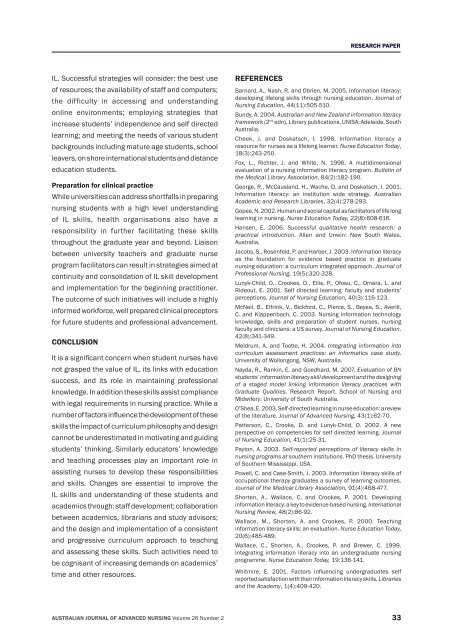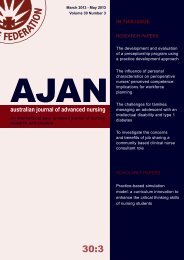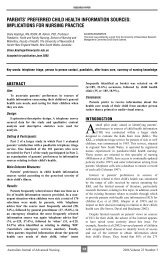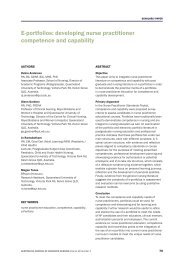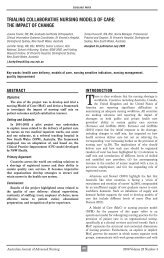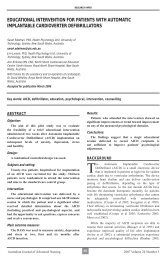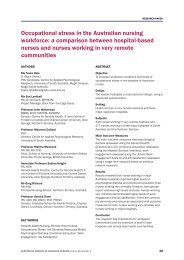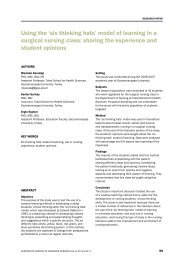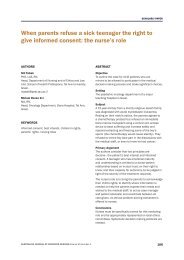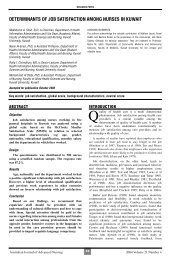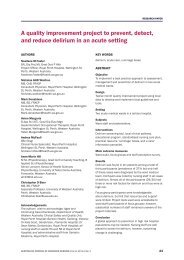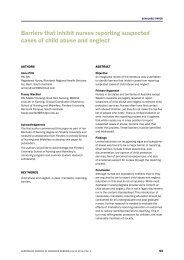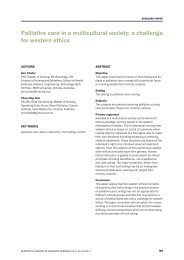Information literacy skill development and life long learning ...
Information literacy skill development and life long learning ...
Information literacy skill development and life long learning ...
Create successful ePaper yourself
Turn your PDF publications into a flip-book with our unique Google optimized e-Paper software.
RESEARCH PAPERIL. Successful strategies will consider: the best useof resources; the availability of staff <strong>and</strong> computers;the difficulty in accessing <strong>and</strong> underst<strong>and</strong>ingonline environments; employing strategies thatincrease students’ independence <strong>and</strong> self directed<strong>learning</strong>; <strong>and</strong> meeting the needs of various studentbackgrounds including mature age students, schoolleavers, on shore international students <strong>and</strong> distanceeducation students.Preparation for clinical practiceWhile universities can address shortfalls in preparingnursing students with a high level underst<strong>and</strong>ingof IL <strong>skill</strong>s, health organisations also have aresponsibility in further facilitating these <strong>skill</strong>sthroughout the graduate year <strong>and</strong> beyond. Liaisonbetween university teachers <strong>and</strong> graduate nurseprogram facilitators can result in strategies aimed atcontinuity <strong>and</strong> consolidation of IL <strong>skill</strong> <strong>development</strong><strong>and</strong> implementation for the beginning practitioner.The outcome of such initiatives will include a highlyinformed workforce, well prepared clinical preceptorsfor future students <strong>and</strong> professional advancement.ConclusionIt is a significant concern when student nurses havenot grasped the value of IL, its links with educationsuccess, <strong>and</strong> its role in maintaining professionalknowledge. In addition these <strong>skill</strong>s assist compliancewith legal requirements in nursing practice. While anumber of factors influence the <strong>development</strong> of these<strong>skill</strong>s the impact of curriculum philosophy <strong>and</strong> designcannot be underestimated in motivating <strong>and</strong> guidingstudents’ thinking. Similarly educators’ knowledge<strong>and</strong> teaching processes play an important role inassisting nurses to develop these responsibilities<strong>and</strong> <strong>skill</strong>s. Changes are essential to improve theIL <strong>skill</strong>s <strong>and</strong> underst<strong>and</strong>ing of these students <strong>and</strong>academics through: staff <strong>development</strong>; collaborationbetween academics, librarians <strong>and</strong> study advisors;<strong>and</strong> the design <strong>and</strong> implementation of a consistent<strong>and</strong> progressive curriculum approach to teaching<strong>and</strong> assessing these <strong>skill</strong>s. Such activities need tobe cognisant of increasing dem<strong>and</strong>s on academics’time <strong>and</strong> other resources.ReferencesBarnard, A., Nash, R. <strong>and</strong> Obrien, M. 2005. <strong>Information</strong> <strong>literacy</strong>:developing <strong>life</strong><strong>long</strong> <strong>skill</strong>s through nursing education. Journal ofNursing Education, 44(11):505‐510.Bundy, A. 2004. Australian <strong>and</strong> New Zeal<strong>and</strong> information <strong>literacy</strong>framework (2 nd edn). Library publications, UNISA: Adelaide, SouthAustralia.Cheek, J. <strong>and</strong> Doskatsch, I. 1998. <strong>Information</strong> <strong>literacy</strong> aresource for nurses as a <strong>life</strong><strong>long</strong> learner. Nurse Education Today,18(3):243‐250.Fox, L., Richter, J. <strong>and</strong> White, N. 1996. A multidimensionalevaluation of a nursing information <strong>literacy</strong> program. Bulletin ofthe Medical Library Association, 84(2):182‐190.George, R., McCausl<strong>and</strong>, H., Wache, D. <strong>and</strong> Doskatsch, I. 2001.<strong>Information</strong> <strong>literacy</strong>: an institution wide strategy. AustralianAcademic <strong>and</strong> Research Libraries, 32(4):278‐293.Gopee, N. 2002. Human <strong>and</strong> social capital as facilitators of <strong>life</strong> <strong>long</strong><strong>learning</strong> in nursing. Nurse Education Today, 22(8):608‐616.Hansen, E. 2006. Successful qualitative health research: apractical introduction. Allen <strong>and</strong> Unwin: New South Wales,Australia.Jacobs, S., Rosenfeld, P. <strong>and</strong> Harber, J. 2003. <strong>Information</strong> <strong>literacy</strong>as the foundation for evidence based practice in graduatenursing education: a curriculum integrated approach. Journal ofProfessional Nursing, 19(5):320‐328.Lunyk‐Child, O., Crookes, D., Ellis, P., Ofosu, C., Omara, L. <strong>and</strong>Rideout, E. 2001. Self directed <strong>learning</strong>: faculty <strong>and</strong> students’perceptions. Journal of Nursing Education, 40(3):116‐123.McNeil, B., Elfrink, V., Bickford, C., Pierce, S., Beyea, S., Averill,C. <strong>and</strong> Klappenbach, C. 2003. Nursing information technologyknowledge, <strong>skill</strong>s <strong>and</strong> preparation of student nurses, nursingfaculty <strong>and</strong> clinicians: a US survey. Journal of Nursing Education.42(8):341‐349.Meldrum, A. <strong>and</strong> Tootle, H. 2004. Integrating information intocurriculum assessment practices: an informatics case study.University of Wol<strong>long</strong>ong, NSW, Australia.Nayda, R., Rankin, E. <strong>and</strong> Goedhard, M. 2007. Evaluation of BNstudents’ information <strong>literacy</strong> <strong>skill</strong> <strong>development</strong> <strong>and</strong> the designingof a staged model linking information <strong>literacy</strong> practices withGraduate Qualities. Research Report. School of Nursing <strong>and</strong>Midwifery: University of South Australia.O’Shea, E. 2003. Self‐directed <strong>learning</strong> in nurse education: a reviewof the literature. Journal of Advanced Nursing, 43(1):62‐70.Patterson, C., Crooks, D. <strong>and</strong> Lunyk‐Child, O. 2002. A newperspective on competencies for self directed <strong>learning</strong>. Journalof Nursing Education, 41(1):25‐31.Payton, A. 2003. Self‐reported perceptions of <strong>literacy</strong> <strong>skill</strong>s innursing programs at southern institutions. PhD thesis. Universityof Southern Mississippi, USA.Powell, C. <strong>and</strong> Case‐Smith, J. 2003. <strong>Information</strong> <strong>literacy</strong> <strong>skill</strong>s ofoccupational therapy graduates a survey of <strong>learning</strong> outcomes.Journal of the Medical Library Association, 91(4):468‐477.Shorten, A., Wallace, C. <strong>and</strong> Crookes, P. 2001. Developinginformation <strong>literacy</strong>: a key to evidence‐based nursing. InternationalNursing Review, 48(2):86‐92.Wallace, M., Shorten, A. <strong>and</strong> Crookes, P. 2000. Teachinginformation <strong>literacy</strong> <strong>skill</strong>s: an evaluation. Nurse Education Today,20(6):485‐489.Wallace, C., Shorten, A., Crookes, P. <strong>and</strong> Brewer, C. 1999.Integrating information <strong>literacy</strong> into an undergraduate nursingprogramme. Nurse Education Today, 19:136‐141.Whitmire, E. 2001. Factors influencing undergraduates selfreported satisfaction with their information <strong>literacy</strong> <strong>skill</strong>s. Libraries<strong>and</strong> the Academy, 1(4):409‐420.AUSTRALIAN JOURNAL OF ADVANCED NURSING Volume 26 Number 2 33


